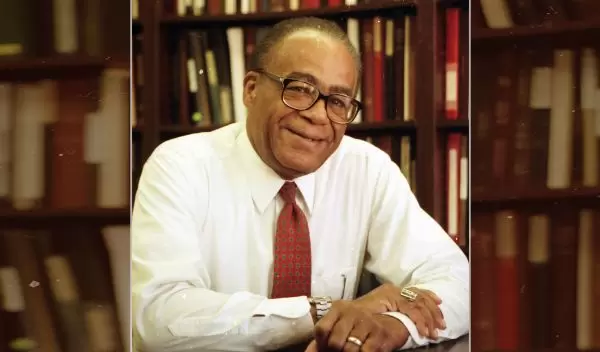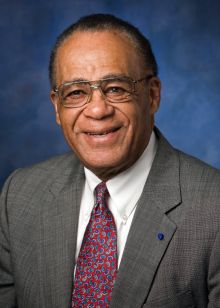
The U.S. National Science Foundation mourns the passing of John Brooks Slaughter
John Brooks Slaughter, Ph.D., director of the U.S. National Science Foundation from 1980-1982, died in Pasadena, Calif., on Dec. 6 at age 89.
Slaughter, the first African American director of NSF, spent his distinguished career championing diversity in science and engineering and achieved many impressive firsts. Following his trailblazing role at NSF, he served as the first African American chancellor of the University of Maryland and the first African American president of Occidental College. He received the inaugural U.S. Black Engineer of the Year award in 1987. In 2015, he was honored at the White House with the Presidential Award for Excellence in Science, Mathematics and Engineering Mentoring.
Dr. Slaughter worked tirelessly to advance the agency’s role in science education and the social sciences, which we now know are critical to vitality of the research enterprise and how research investments strengthen the nation today, said NSF Director Sethuraman Panchanathan. “He understood the importance of engineering as its own field and was a leader in establishing the Engineering Directorate. He fought for the full inclusion of women and minorities in science and engineering and remains a role model for how we continue that work today. He expanded the frontiers of NSF’s work in many ways, and his legacy endures through many NSF programs and initiatives that still exist today.”
Prior to joining NSF for the first time, Slaughter served as director of the University of Washington’s Applied Physics Laboratory, where he led studies in oceanographic and atmospheric research. In 1977, he was recruited by NSF Director Richard Atkinson to serve as assistant director for the Astronomical, Atmospheric, Earth and Ocean Sciences Directorate. Slaughter then returned to academia in 1979 as provost at Washington State University.
In 1980, Slaughter received a personal call from President Jimmy Carter urging him to accept the nomination as director of NSF.
As the head of NSF, Slaughter had the pioneering vision to advance the foundation’s role in science education, advocating publicly against budget cuts that threatened NSF’s role in science education and the social sciences. The NSF budget support in these areas was briefly terminated, but Slaughter led a reorganization that would enable the agency to remain engaged in education and broadening participation programs.
Slaughter also believed that engineering needed a more prominent role within NSF and that expanding its visibility as a scientific endeavor would be an asset to the agency and the nation. Building on the groundwork laid by his predecessors, he led the charge to propose, develop and establish NSF’s Directorate for Engineering. Today, NSF’s Engineering Directorate plays an integral role in many advanced research priorities across the agency, including Artificial Intelligence, Advanced Manufacturing and Quantum research – all of which help drive American innovation.
“Dr. Slaughter was a visionary who elevated engineering research and education within NSF, understood the importance of close partnership between industry with academia to create economic impact, and inspired engineers across the nation to innovate for our nation’s future,” said Susan Margulies, assistant director for Engineering.
It was during his tenure as an NSF Assistant Director that Slaughter observed a lack of funding opportunities for minority researchers from historically black colleges and universities. As director, he vowed to try and change that, and under Slaughter’s leadership, NSF funded critical programs at minority serving institutions. He also laid the foundation for a variety of NSF's current broadening participation programs, including the HBCU STEM Undergraduate Success Research Center and the NSF INCLUDES National Network, both of which study and scale best practices for diversity in STEM.
Slaughter’s legacy endures through many NSF programs and the growing diversity of the U.S. scientific workforce. He led the agency with conviction, applying his expertise and his perspective as an African American. He will long be celebrated by those who follow the paths he trailblazed.

